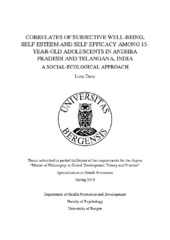| dc.description.abstract | Background: Today, there are more young people than at any other time in human history. This large and growing group offers unprecedented potential for economic and social progress. In particular, our 1.2 billion adolescents between the ages of 10 and 19 are integral to meeting the Sustainable Development Goals. Subsequently, studying and supporting their strengths and skills is essential. India is home to more adolescents than any other nation and this cohort of young people represents a great demographic dividend. Within health promotion, health is seen as an important resource for life, which encompasses social and personal capabilities and physical fortitude. Important health-related outcomes which have notable benefits during adolescence and beyond are subjective well-being and psychosocial skills, including self-esteem and self-efficacy. Analytical model: Guided by the principles of positive youth development, an ecological approach was adopted to study correlates of subjective well-being, self-esteem and self-efficacy among Indian adolescents. A conceptual framework was produced based on the Ecological Systems Model (ESM) (Bronfenbrenner 1979, 1986). Research objective and questions: This study sought to address the following core objective; to understand the relationship between individual and social-ecological factors and the well-being and psychosocial skills of adolescents in Andhra Pradesh and Telangana, India. Two main research questions were asked. The first question was “what microsystem factors out of caregiver characteristics, parent relations and peer relations, are associated with the subjective well-being, self-esteem and self-efficacy of 15-year-old Indian adolescents?” A related sub-question was also asked: “are parent relations or peer relations more important for subjective well-being, self-esteem and self-efficacy among 15-year-old Indian adolescents?” The second question was “what other factors at the individual, exosystem, macrosystem and chronosystem levels help to explain the variation in subjective well-being, self-esteem and self-efficacy among 15-year-old Indian adolescents?” Data and methods: The design was a secondary analysis of data from Young Lives for the Younger Cohort in India (Andhra Pradesh and Telangana states). This study primarily used data from Round 5, collected in 2016 when the adolescents were 15 years old (N = 1900). Hierarchical multiple regression analysis was performed to develop models accounting for the best available variance in subjective well-being, self-esteem and self-efficacy, given the limits of available variables. Sets of covariates were offered in blocks, based on the ESM. Results and discussion: In the final adjusted models, caregiver’s subjective well-being, coming from a subjectively poor household, state of residence, Peabody Picture Vocabulary Test (PPVT) score (used to represent cognitive ability), parent relations, and school enrolment status were significantly associated with subjective well-being. Significant correlates of self-esteem were: peer relations, parental relations, state of residence, caregiver’s pride, caregiver’s agency, and caregiver’s subjective well-being. Peer relations, parent relations, school enrolment, PPVT score, Wealth Index (WI), caregiver’s pride and gender were significant correlates of self-efficacy. The non-representative study sample has restricted the generalisability of this study. There were also analytical limitations, including the cross-sectional design which prevented the assessment of causality. However, this thesis has offered insights into the associations between different individual and social-ecological factors and subjective well-being, self-esteem and self-efficacy, and has drawn attention to an insufficiently researched topic, country and context. Conclusion: The results of this study were consistent with the theory that positive adolescent development occurs across multiple milieus. It was concluded that health promotion initiatives should target several contexts simultaneously. By building on existing research, this thesis has generated valuable information which may be used to guide further studies and encourage the introduction of appropriate and effective youth-centred health promotion programmes in India. | en_US |
